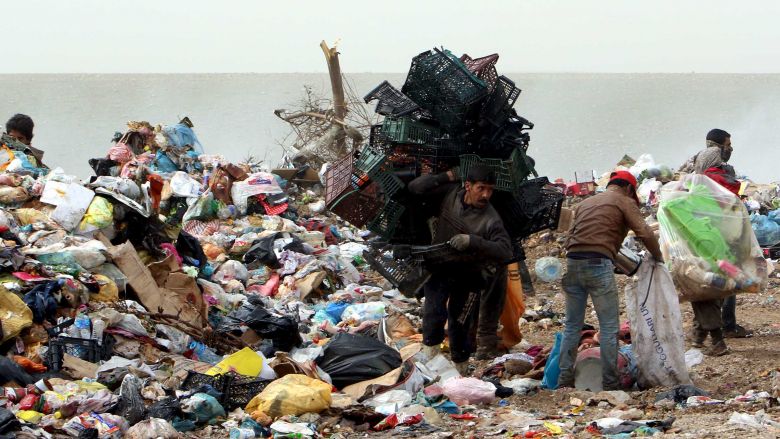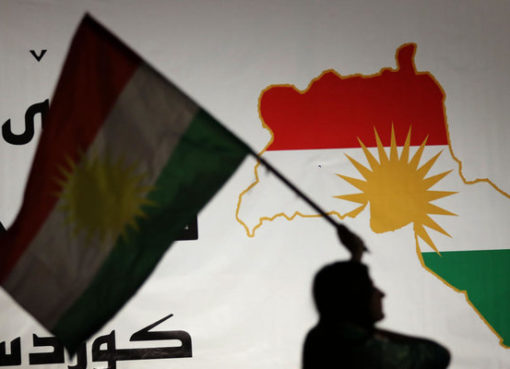Iraq’s Kurdish region feels the bite of failing to plan ahead
Near a quiet park in Sulaimaniya, the second largest city in Iraq’s Kurdistan region, Ali and his fellow taxi drivers are engaged in deep conversation. The topic touches upon the struggles that he and his friends are now facing.
“There are few customers these days. People don’t have the money to get in cabs anymore,” says 28-year-old Ali, who preferred not to give his surname as his primary job is his work as a policeman. Ali is forced, like many of his fellow government employees, to seek a second form of income to survive, because of the rising cost of living and the irregularities he has experienced in receiving his salary.
“They don’t know how we live. I know people who can’t buy powdered milk for their babies,” Ali says in anger, as his fellow drivers silently nod their heads in agreement. A father of three, Ali’s emotions run high when he talks of people being unable to feed their children.
The tall, gaunt policeman-turned-cabbie left his small rural town south of Sulaimaniya and moved to the city less than a decade ago. After a couple of years he managed to secure a job with Sulaimaniya’s police department.
In the heydays of Iraq’s Kurdistan, when the autonomous region was experiencing unprecedented levels of prosperity, Ali was content. A few years ago, he built a house on Sulaimaniya’s outskirts and bought a car. As financial hardship beckoned, he bought a cab to have a second source of income.
His story mirrors that of Iraqi Kurdistan’s quick rise—and its unexpected economic slump due to sharp decline in oil prices, constant disputes with the federal government in Baghdad and a costly war against Daesh.
For a long time, the Kurdish region was a marginalized, conflict-stricken part of Iraq. But it had witnessed staggering economic growth following the fall of Saddam Hussein’s regime in 2003 at the hand of the U.S.-led coalition.
A steady and rising stream of cash from Baghdad—estimated at around $13 billion in 2012 and 2013, handed to the Kurds as their share of the country’s national budget—fueled the Kurdish economy. Kurdistan’s growth rate hit a staggering 12 percent in 2012, much higher than many states across the world. A business-friendly investment law in 2006 paved the way for foreign and local businesses to pour as much as $37 billion into the local economy in the ensuing years.
At times, Iraqi Kurdistan was hailed as the next Dubai, or an emerging business hub in a volatile Middle East.
But the story came to an abrupt halt as Kurds began to export their oil independently without involving the authorities in Baghdad. An unexpected war with Daesh and then the global crash in oil prices meant there was little money left in the coffers.
At present, Kurdistan’s Regional Government, or KRG, is essentially bankrupt.
For the past couple of years, the KRG’s revenues have hardly reached $500 million a month, although it still needs three quarters of a billion simply to pay for the 1.4 million employees who are on its payroll. Kurdistan’s economy, it appears, has gone from boom to relative bust in the span of just a decade.
“What Kurdistan is experiencing now is an economic heart attack,” says Firsat Sofi, a member of the Kurdish Parliament representing the ruling Kurdistan Democratic Party.
“With the right policies we can overcome this, but first we need to stop [relying solely on oil as our source of revenue],” he says.
Sofi is not alone. Many criticize the KRG for not following sound economic policies whilst its coffers were awash with cash. The bulk of the government’s budget went to paying those on its payroll, in an attempt to appease the five-million strong population of the Kurdish region.
“Kurdistan needs to invest in non-oil sectors in order to have a diverse economic base, and save cash reserves in times of high oil prices in order to maintain its spending levels during periods of low oil prices like now,” says Bilal Wahab, director of the Center for Development and Natural Resources at the American University of Iraq. “The KRG, like any other oil-dependent government, should create financial and economic institutions [that will] soften such instability.”
And when the KRG ran into hurdles generating sufficient revenues to sustain its essentially rentier economy, it resorted to cutting its employees’ salaries between 10 percent and 75 percent depending on their rank. That has culminated in a wave of public discontent. Over the past few months, street protests have popped up here and there, mostly in Sulaimaniya and surrounding areas, and many civil servants, including teachers and doctors, have gone on prolonged periods of strikes.
Even Ali and his fellow police officers went on strike when the government slashed their salaries. The KRG, however, has not reduced the salaries of everyone. Its armed forces known as the Peshmerga—who are fighting Daesh on the ground—and other sections of the security forces, known as Asayish who deal with more serious crimes related to state security and terrorism, continue to accrue benefits.
That appears to be a calculated measure to stave off any prospects of public unrest escalating to destabilizing levels.
Although rising income levels had the majority of Iraqi Kurds busy enjoying the few exceptional years of prosperity, the KRG’s missteps and extravagant spending throughout the years were unsustainable. Key sectors of the economy had been seriously damaged as a result of poor policies.
While Kurdistan was once Iraq’s bread basket, agriculture was never developed in any serious fashion in recent years. The Kurds had to import basic food items from neighboring countries such as Iran, Turkey and Syria.
Izzat Sabir, who heads the Kurdish Parliament’s finance and economics committee, tells Newsweek Middle East that poor planning rolled back key sectors of the economy. Up until 2011 in Sulaimaniya, for instance, the government gave housing loans only to those living in urban centers, refusing to cover rural areas. Consequently, many families abandoned their villages in the hope of receiving such funds.
“Because of the large budget it received (from Baghdad), the KRG never did something about building or developing other sectors of the economy,” says Sabir.
Facing extensive pressure from the public to fix the economy, the government has now embarked on a set of economic reforms. But these steps have not gone beyond cutting salaries and increasing taxes. Many demand structural changes to Kurdistan’s economic system.
Sabir believes that the KRG was rash in deciding to export its oil unilaterally in 2013. “The KRG should have delayed its direct exports perhaps by two years,” Sabir adds.
“The upshot of exporting the oil via Baghdad under such circumstances is that it would have been Baghdad’s responsibility then to compensate the budget deficit by taking loans from international institutions or [at least] make use of the cash reserves at the Central Bank of Iraq.”
However, the KRG was amiss; it did not foresee a quick drop in oil prices—or a costly war with Daesh when it embarked upon its decision to export its oil independently. That decision was taken when oil prices were over $100 a barrel.
Many MPs such as Sabir and Sofi have called for an end to monopolies over the various economic sectors in Kurdistan, that are controlled by figures with strong connections to senior politicians.
They further slammed laws that exempt major investors in the energy sector and other sectors from paying taxes for periods going up to 25 years, believing that such laws have deprived Kurdistan of another source of revenues.
Hard pressed for cash, the government has resorted to loans from neighboring countries such as Turkey and some local and international firms operating in Kurdistan.
Although the figures are disputed, the Kurdish government is believed to owe somewhere between $14 billion to $20 billion to different parties including delinquent payments to its civil servants. These figures have mostly come from parliamentarians such as Sabir.
“We’re in a trap,” says Sabir. “The government will have to borrow more to survive and this will only make matters worse and further deepen the public’s distrust toward it.”
Distrust, in fact, already runs deep. Many ordinary Kurds are suspicious about the extent of oil revenues or how these are being spent. At public protests, the constant refrain heard is that the government should be forthcoming about how it handles the energy sector.
“There is not enough transparency about the KRG petroleum industry in general and there is a lot of mistrust and misunderstanding among the public regarding the current economic recession,” says Wahab, an energy expert.
The stakes are high for Iraqi Kurds given the implications that the current economic and financial crisis can have for the province’s stability going forward. It’s not clear how and when Iraqi Kurdistan will recover from the current crisis or if the prosperous years of the past will be repeated. But as Sofi puts it: “If there will be another economic heart attack, we just won’t be able to get over it.”
For Ali and those like him at the receiving end of decisions made by the government, tough times lie ahead. The pipeline that carries the Kurdish oil to international markets via
Turkey has been out of service since mid-February, after it was subject to sabotage inside the Turkish territory, as Kurdish officials have said.
That shows the vulnerability of KRG’s economy and how uncertain its prospects are as it can’t take the continuity of its oil exports for granted even at current low prices.
“I’ve some little savings left,” says Ali. “But it can carry me just for a couple of months. I just don’t know how I will [manage] after that.”
Source: Newsweek Middle East, March 23, 2016
http://newsweekme.com/kurdistans-economy-is-on-its-knees/
Cover image: Garbage pickers collect recyclable materials at a garbage dump in Erbil, in Iraq’s northern autonomous Kurdistan region, February 21. People are finding it hard to make ends meet in Iraq’s Kurdish region. economy REUTERS/Azad Lashkari








Comment here